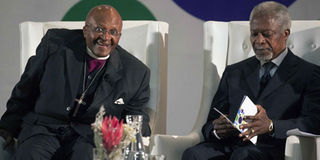Annan warns on quitting ICC

PHOTO | RODGER BOSCH Archbishop emeritus Desmond Tutu (left) with Mr Kofi Annan, former UN secretary-general during the third annual Desmond Tutu International Peace Lecture, at the University of the Western Cape, in Cape Town, as part of Archbishop Tutu’s 82nd birthday celebrations.
What you need to know:
- Speaking in Cape Town, Annan said “quite a few leaders are resisting and fighting” the ICC
- The ICC was a place of last resort that would not be needed if local courts were competent to try the cases, said Annan
CAPE TOWN, Monday
Former UN secretary-general Kofi Annan said it would be a “badge of shame” for Africa if its leaders voted to leave the International Criminal Court.
Speaking in Cape Town, Annan said “quite a few leaders are resisting and fighting” the ICC, but cautioned on a vote against the tribunal without an alternative.
“If they fight the ICC, vote against the ICC, withdraw their cases, it will be a badge of shame for each and every one of them and for their countries if they do that,” he said.
Annan denied claims by African leaders that The Hague-based tribunal was targeting the continent and accused them of protectionism.
“Let me stress that it is the culture of impunity; it’s individuals who are on trial at the International Criminal Court, not Africa,” said Annan, delivering the annual Desmond Tutu Peace Lecture on the South African icon’s 82nd birthday.
SPECIAL SUMMIT
Amid growing opposition to the ICC, the African Union is set to debate the continent’s relationship with the world’s first permanent court to try genocide, war crimes and crimes against humanity at a special summit on Friday and Saturday.
The ICC was a place of last resort that would not be needed if local courts were competent to try the cases, said Annan.
“But when we hear the debate going on, the leaders are protecting themselves. No-one speaks for the victims,” he said.
The meeting follows the 54-member bloc’s accusations that the court singles out Africans for prosecution, pointing to the high-profile trials of former Liberian president Charles Taylor and top Kenyan leaders.
But Annan said this was “not the case”, adding he had been proud that so many African countries with weak judicial systems had given strong backing to the ICC.
Four of the cases before the ICC had been referred by African leaders themselves, while the UN Security Council had moved on two others concerning Darfur and Libya, Annan said.
The trial against Kenyan Deputy President William Ruto started in September, and President Uhuru Kenyatta’s case will begin on November 12.
Both are charged with stoking violence after a disputed 2007 presidential election.





